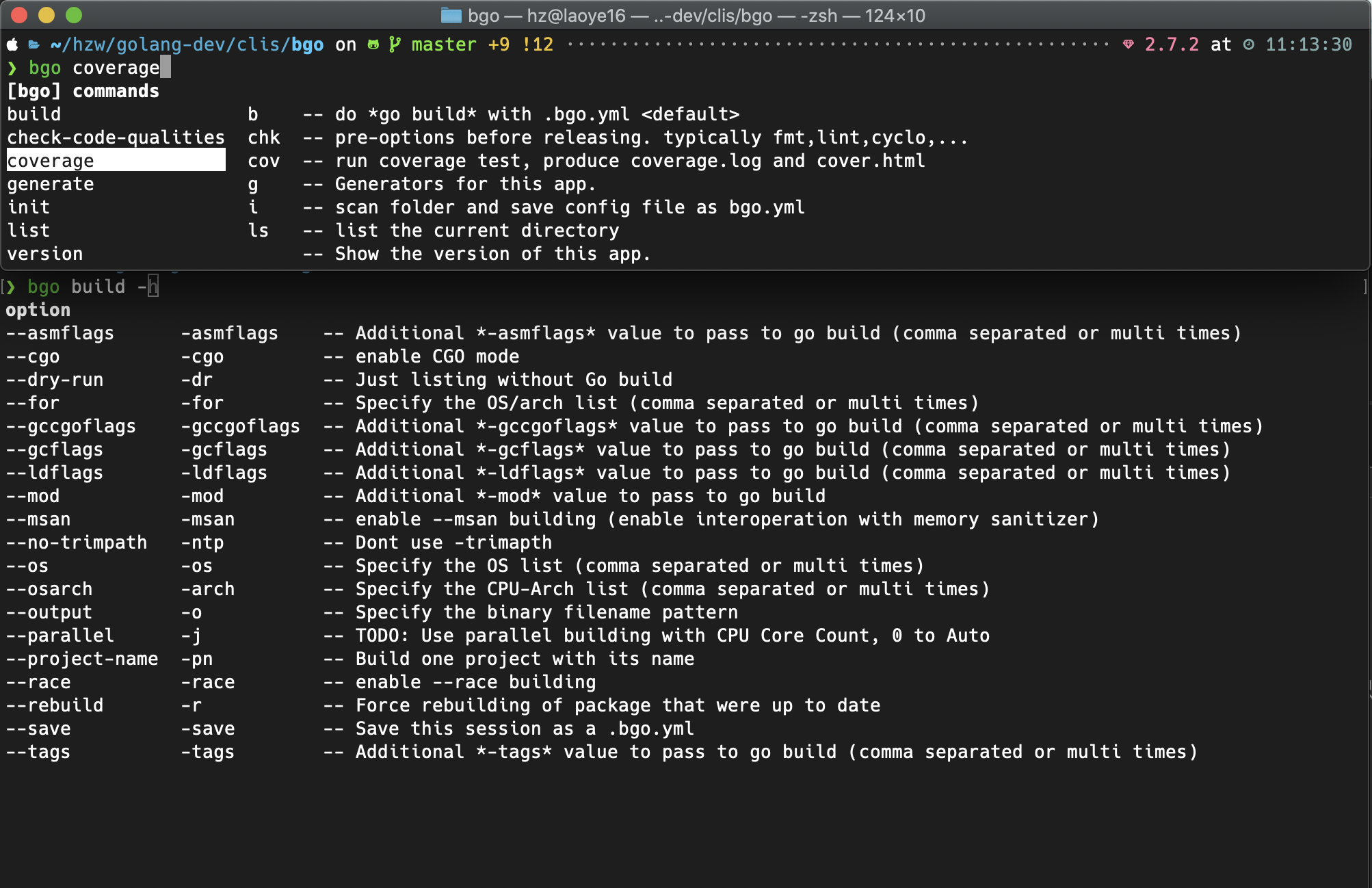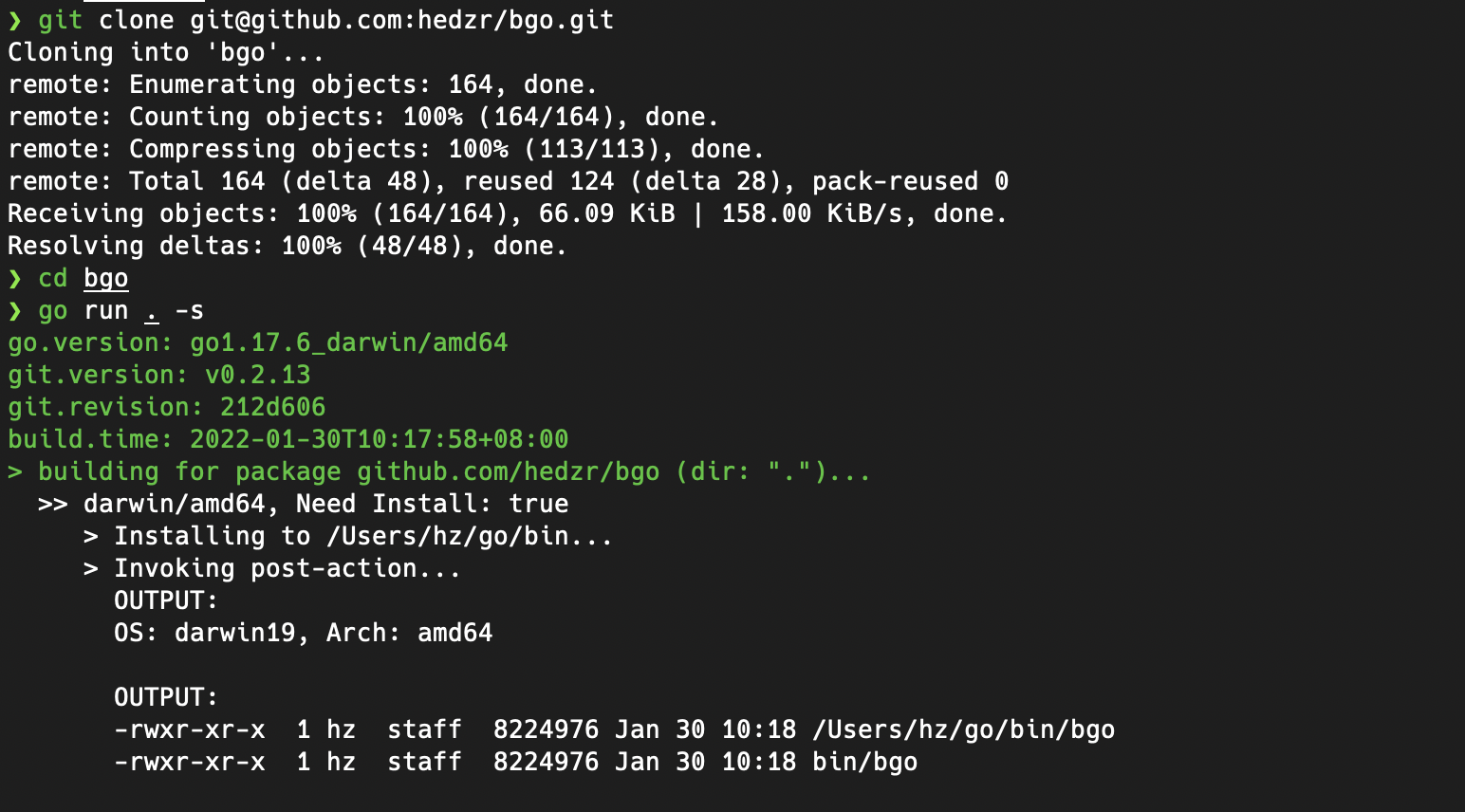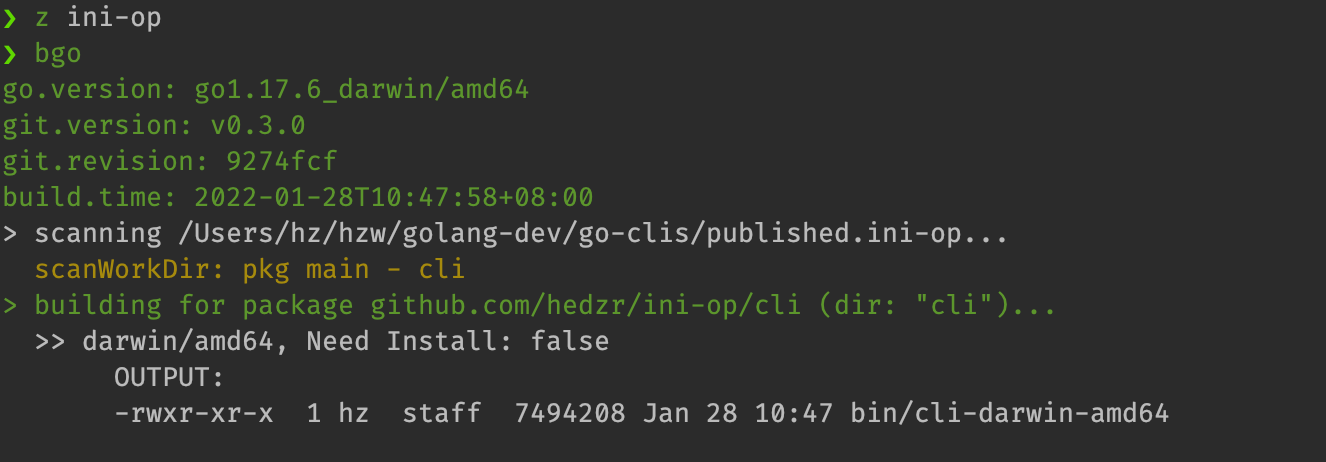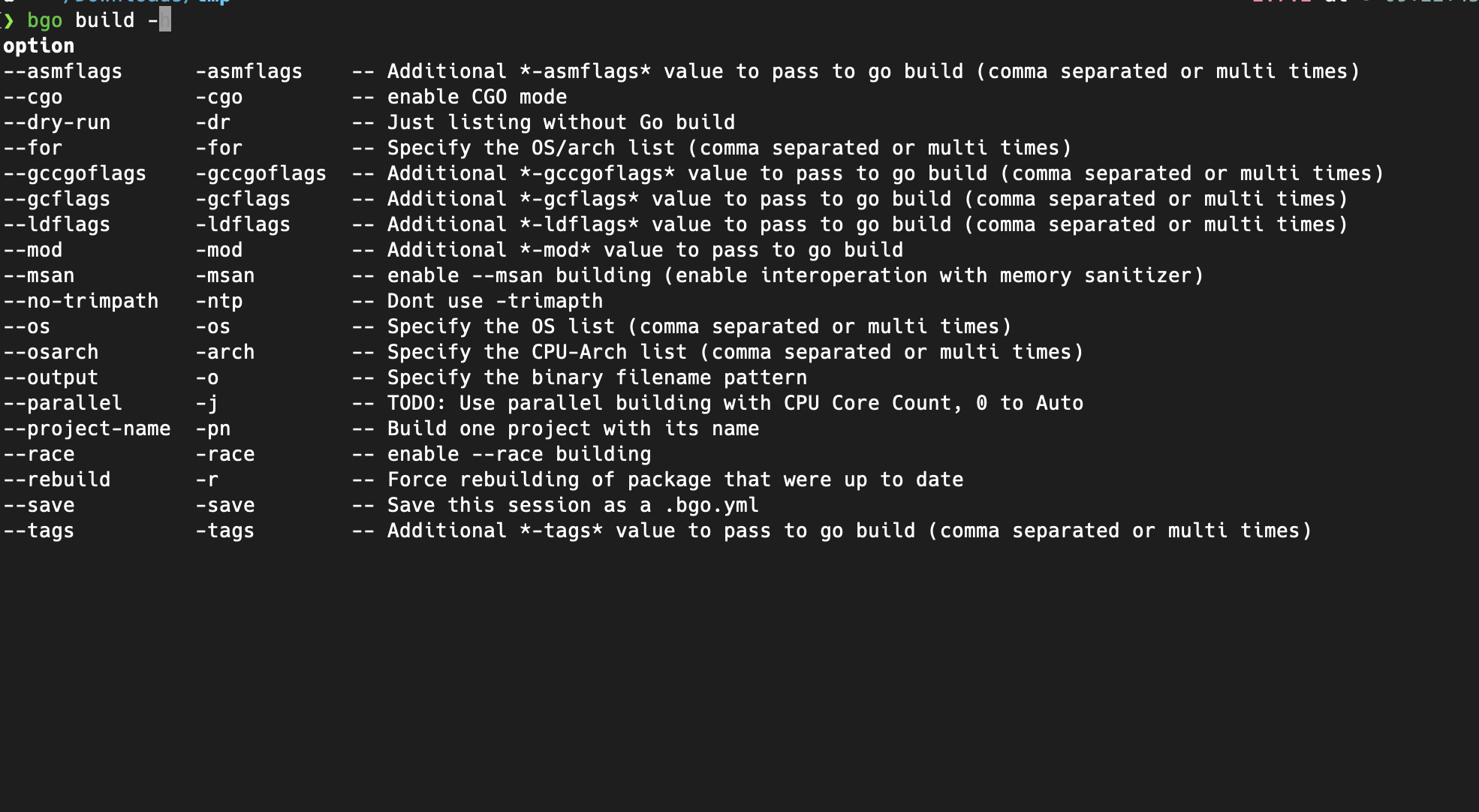bgo provides a super easy way to build your go apps.
All things you need to do is entering the golang project directory and entering bgo and pressing Enter.
powered by cmdr.
bgo makes your golang building life easier, it's an efficient and extensible build tool.
-
bgoorbgo build: Run go building with or without a config file.bgo.yml -
bgo run -- ...: Forward command-line togo runas is -
bgo test -- ...: Forward command-line togo testas is -
bgo init: Scan the directory to grab all main packages and initial.bgo.yml -
bgo list: list managed projects in all of.bgo.yaml -
bgo sbom: dump #SBOM information itself or specified executables -
More extensible commands
-
pre-builtins (bundled by
80.aliases.yml)bgo chk|check-code-qualitiesbgo cov|coverage
see also #Extensible Commands
-
-
While
-
you have lots of small cli apps in many sub-directories
-
one project wants go1.18beta1 and others stays in go1.17
-
too much
-tags,-ldflags,-asmflags, ... -
multiple targets, cross compiling
-
etc.
have a try with
bgo.
-
-
v0.5.25
- security patch: bump golang.org/x/crypto from 0.15.0 to 0.17.0, and more
-
v0.5.21/23
- removed sending to coverall since a unknown/untagged error when gh action triggering the release
- security patch: bump golang.org/x/net from 0.15.0 to 0.17.0, and more
- fixed a bug from errors.v3
- upgrade deps
-
v0.5.19
- upgrade deps
- fixed:
StripOrderPrefix, ...
-
v0.5.18
- upgrade deps
- fixed: change
SaveAs(--output) field from string slice to string
-
v0.5.16
- upgrade deps
- fixed a little
-
More in CHANGELOG
Download the prebuilt binaries from Release page.
Or Built from source code:
go install github.com/hedzr/bgo@latest
bgo --help # -h
bgo --version # -V
bgo --build-info # -#You may clone and compile bgo from source code:
git clone https://github.com/hedzr/bgo.git
cd bgo
go run . -sgo run . -s will run bgo from source code and install itself to ~/go/bin/.
You could run bgo via docker way:
docker pull hedzr/bgo
# or
docker pull ghcr.io/hedzr/bgo:latestAnd run it:
docker run -it --rm -v $PWD:/app -v /tmp:/tmp -v /tmp/go-pkg:/go/pkg hedzr/bgoFor macOS/Linux, there is a brew formula:
brew install hedzr/brew/bgoTo work without .bgo.yml, simply go into a folder and run bgo, the cli apps under the folder will be found out and built.
cd my-projects
bgo # start `bgo` in auto mode, see Scopes chapter belowFilter the target systems by -for OS/ARCH, -os OS and -arch ARCH:
bgo --for linux/386 -for linux/amd64,darwin/arm64
bgo -os linux -arch 386 -arch amd64 -arch arm64Both long and short options are available for for, os and arch.
Their values are stacked by specifying multiple times, so -arch 386 -arch amd64 -arch arm64 is same with --arch 386,amd64,arm64.
cd my-projects
bgo init # create bgo.yml by scanning
mv bgo.yml .bgo.yml # rename itSee sample of .bgo.yml
bgobgo will load projects from .bgo.yml and build them
bgo -s: short mode - this will build first project with current GOOS/GOARCH.bgo|bgo -a: auto mode - build projects in.bgo.ymlbgo -f: full mode - build by scanning current directory
Run bgo gen sh --zsh to install auto-completion script to the proper location and enable the feature:
For macOS, you may install zsh completion script manually (not recommended, the better way is by HomeBrew):
bgo gen sh --zsh --output "$(brew --prefix)/share/zsh/site-functions/_bgo"Run bgo gen sh --bash -o=bgo.bash to get bash completions script and put it to the right location. Generally it should be:
bgo generate shell --bash -o=bgo.bash
mv bgo.bash /etc/bash-completion.d/bgoNothing needs to do if installed via brew (since v0.3.3+).
bgo run can forward arguments to go run. For the command line
bgo run -- ./...The underlying real command will be run:
go run ./...bgo test can forward arguments to go test. For the command line
bgo test -- ./...The underlying real command will be run:
go test ./...Checking executable's SBOM (Software Bill Of Materials) without golang installed:
bgo sbom # show sbom of bgo itself
# Show these executables
bgo sbom ~/go/bin/gopls ~/go/bin/golangci-lintThe commands system of bgo can be extensible by editing .bgo.yaml.
bgo loads all bgo.yaml as its configurations from these locations:
- Main Config Files:
/etc/bgo/bgo.ymlandconf.d/*.ymlin it/usr/local/etc/bgo/bgo.ymlandconf.d/*.ymlin it Any of them will be loaded as default config set.
- Secondary Config Files:
$HOME/.bgo/bgo.ymlandconf.d/*.ymlin it$HOME/.config/bgo/bgo.ymlandconf.d/*.ymlin it Any of them will be loaded as extensible config set.
- Alternative Config File:
./.bgo.yamlThis config file is used to current building project bybgo. The scanning results of golang CLI apps from current directory will be written into this file.
The extensible commands from config file is a feature of hedzr/cmdr. It generally looks like:
Expand to source codes of `80.aliases.yml`
# ~/.config/bgo/conf.d/80.aliases.yml
app:
aliases:
# group: # group-name (optional). such as: "别名".
commands:
# - title: list
# short-name: ls
# # aliases: []
# # name: ""
# invoke-sh: ls -la -G # for macOS, -G = --color; for linux: -G = --no-group
# # invoke: "another cmdr command"
# # invoke-proc: "..." # same with invoke-sh
# desc: list the current directory
# - title: echo
# invoke-sh: |
# # pwd
# echo "{{$flg := index .Cmd.Flags 0}}{{$path :=$flg.GetDottedNamePath}} {{$fullpath := .Store.Wrap $path}} {{$fullpath}} | {{.Store.GetString $fullpath}}"
# desc: print the name
# flags:
# - title: name
# default: # default value
# type: string # bool, string, duration, int, uint, ...
# group:
# toggle-group:
# desc: specify the name to be printed
- title: check-code-qualities
short-name: chk
# aliases: [check]
# name: ""
invoke-sh: |
which golint || go install golang.org/x/lint/golint
which gocyclo || go install github.com/fzipp/gocyclo
echo
echo
echo "Command hit: {{.Cmd.GetDottedNamePath}}"
echo "fmt {{.ArgsString}} ..."
gofmt -l -s -w {{range .Args}}{{.}}{{end}}
echo "lint {{.ArgsString}} ..."
golint {{.ArgsString}}
echo "cyclo ."
gocyclo -top 13 .
# invoke: "another cmdr command"
# invoke-proc: "..." # same with invoke-sh
shell: /usr/bin/env bash # optional, default is /bin/bash
desc: pre-options before releasing. typically fmt,lint,cyclo,...
- title: coverage
short-name: cov
invoke-sh: |
# pwd
# echo "{{$flg := index .Cmd.Flags 0}}{{$path := $flg.GetDottedNamePath}} {{$fullpath := .Store.Wrap $path}} {{$fullpath}} | {{.Store.GetString $fullpath}}"
# echo "{{$flg = index .Cmd.Flags 1}}{{$path = $flg.GetDottedNamePath}} {{$fullpath2 := .Store.Wrap $path}} {{$fullpath2}} | {{.Store.GetString $fullpath2}}"
# echo "{{$flg = index .Cmd.Flags 2}}{{$path = $flg.GetDottedNamePath}} {{$fullpath3 := .Store.Wrap $path}} {{$fullpath3}} | {{.Store.GetString $fullpath3}}"
go test -v -race \
-coverprofile={{.Store.GetString $fullpath2}} \
-covermode=atomic -timeout=20m \
{{if not .Args}}.{{else}}{{.ArgsString}}{{end}} \
| tee {{.Store.GetString $fullpath3}}
go tool cover \
-html={{.Store.GetString $fullpath2}} \
-o={{.Store.GetString $fullpath}}
desc: run coverage, produce coverage.txt and cover.html
examples: bgo cov ./... or bgo cov
flags:
- title: html
default: cover.html # default value
default-placeholder: FILE
type: string # bool, string, duration, int, uint, ...
group:
toggle-group:
desc: specify the html filename to be output
- title: text
default: coverage.txt # default value
default-placeholder: FILE
type: string # bool, string, duration, int, uint, ...
group:
toggle-group:
desc: specify the coverprofile filename
- title: log
default: coverage.log # default value
default-placeholder: FILE
type: string # bool, string, duration, int, uint, ...
group:
toggle-group:
desc: specify the name to be loggedThe config adds two top-level subcommands: chk(check-code-qualities) and cov(coverage)
Another sample is the bundled 91.more.aliases.yml:
Expand to source codes of `91.more.aliases.yml`
app:
aliases:
# group: # group-name (optional). such as: "别名".
commands:
# - title: list
# short-name: ls
# # aliases: []
# # name: ""
# invoke-sh: ls -la -G # for macOS, -G = --color; for linux: -G = --no-group
# # invoke: "another cmdr command"
# # invoke-proc: "..." # same with invoke-sh
# desc: list the current directory
- title: yolo
short-name: y
invoke-sh: |
which yolo || { echo "installing yolo..." && go install -v github.com/azer/yolo; }
yolo -i *.go -c 'go build' -a localhost:8080 {{.ArgsString}}
desc: print the name
- title: echo
invoke-sh: |
# pwd
echo "{{$flg := index .Cmd.Flags 0}}{{$path :=$flg.GetDottedNamePath}} {{$fullpath := .Store.Wrap $path}} {{$fullpath}} | {{.Store.GetString $fullpath}}"
desc: print the name
flags:
- title: name
default: # default value
type: string # bool, string, duration, int, uint, ...
group:
toggle-group:
desc: specify the name to be printedbgo building subcommand was inspired by many tools:
- https://github.com/mitchellh/gox
- https://dave.cheney.net/2015/08/22/cross-compilation-with-go-1-5
- https://github.com/davecheney/golang-crosscompile
- https://github.com/laher/goxc
- Makefile
Apache 2.0








